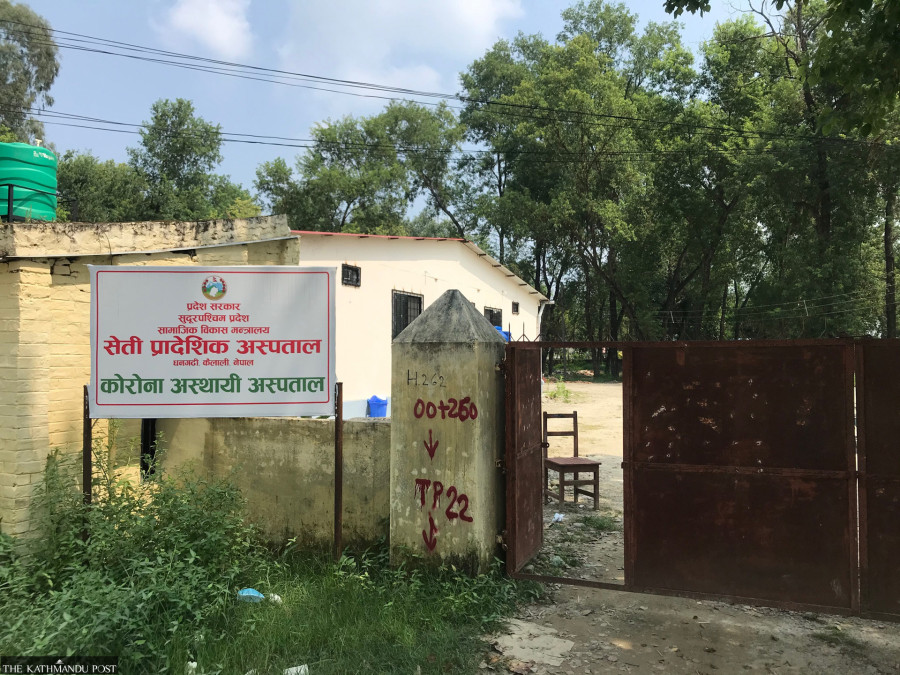Sudurpaschim Province
Infections soar in Sudurpaschim as restrictions are lifted
The number of Covid-19 patients suffering from diarrhoea, fatigue, loss of appetite and bloating, among other symptoms, has increased, health workers say.
Arjun Shah
The relaxation of prohibitory orders and complacency among the general public have contributed to the rise in the number of Covid-19 cases in Sudurpaschim Province, health workers say.
Social gatherings and crowding in public places have further worsened the situation, with the virus rapidly spreading in settlements across various districts of the province.
Prohibitory orders were imposed in various districts of Sudurpaschim Province April 29 onwards. The provincial government started introducing gradual relaxations from July 11 in various districts.
Businesses including hotels, restaurants and transportation have resumed services in all districts of the province.
Bimal Khadka, a resident of Dhangadhi Ward 4, says she has been witnessing free public movement and large gatherings akin to pre-pandemic days in her area.
“We can see crowds in the bazaar area and in shops. Traffic jams and vehicular congestion in Dhangadhi reflect the carelessness of both the authorities and the public. People have even stopped wearing face masks these days,” he said.
Doctors at the Seti Provincial Hospital in Dhangadhi say Sudurpaschim is seeing an uptick in coronavirus cases with patients suffering from symptoms different than previously reported.
Dr Nirajan Datta Sharma Paudel, a consultant physician at the hospital, said the number of coronavirus patients suffering from diarrhoea, fatigue, loss of appetite and abdominal bloating and fullness among others has increased.
“I was suffering from diarrhoea for the last two days. I visited the hospital and got tested for coronavirus. The result came positive,” said a 21-year-old man from Dhangadhi who is receiving treatment for Covid-19 at the Seti Provincial Hospital. “I didn’t know I was infected, as I was not showing any symptoms of fever, cold and headache as is expected in infected individuals.”
According to the data of the Sudurpaschim Health Directorate, 567 patients have died of coronavirus in Sudurpaschim Province.
The coronavirus infection rate in Sudurpaschim stood at 15 percent in the second week of July, which escalated up to 37 percent by the third week. The infection rate in Sudurpaschim is higher compared to the other six provinces of the country, according to the health directorate.
Out of 1,531 PCR tests conducted between July 9 and July 15 in Sudurpaschim, 224 tested positive for Covid-19. Between July 16 and July 22, 207 out of 567 swab samples reported positive results, the data of the health directorate showed.
According to the Ministry of Health and Population, Sudurpaschim has the highest infection rate in the country followed by Gandaki, Karnali and other provinces. Province 2 has the lowest infection rate, with only 144 out of 2,517 swab samples testing positive between July 16 and July 22, the record of the ministry showed.
In Sudurpaschim Province, PCR tests are being conducted at Seti Hospital in Dhangadhi, Mahakali Hospital in Mahendranagar and in other facilities in Dadeldhura, Doti, Bajhang, Baitadi and Achham districts.
“Between July 16 and July 22, Covid-19 cases have increased in Dhangadhi, Mahendranagar, Dadeldhura and Baitadi districts. The data showed that the Covid-19 infection rate has doubled in Sudurpaschim Province,” said Dr Gunaraj Awasthi, director at the Sudurpaschim Health Directorate.
Another leading factor for the surge in coronavirus cases in the province is the movement of migrant workers in and out of the country through various border points. A large number of migrant workers from various districts of Sudurpaschim Province work in India.
“Implementation of health safety measures at the border points and monitoring of incoming and outgoing traffic must be prioritised to check the spread of the virus,” said Awasthi.
Gauriphanta border point in Kailali and Gaddachowki border point in Kanchanpur are the two main border points in the province.
According to the Ministry of Social Development, a holding centre with a capacity of 1,000 beds is being constructed at both border points.
“In the coming days, we will only allow people who have undergone antigen tests to enter Nepal from India. Until now, we are only performing antigen tests on coronavirus suspects,” said Lal Bahadur Khadka, Minister of Social Development in Sudurpaschim Province.
According to the data of the Ministry of Social Development, an estimated 300,000-400,000 individuals in foreign employment had returned to Sudurpaschim Province during the first wave of the pandemic. Among them, over 150,000 were from India alone.
The Ministry estimates more than a million Nepalis from the province go to various places in India for work annually.




 11.84°C Kathmandu
11.84°C Kathmandu















